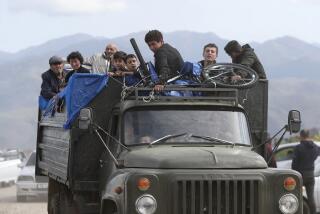Azerbaijan Says Armenia Invades, Aided by Ex-Soviet Units : Ethnic conflict: The accusation is denied. But it spotlights the uncertain future of the old Red Army as it divides into separate national forces.
- Share via
MOSCOW — Azerbaijan on Saturday accused Armenia of launching a surprise invasion of its territory with the aid of units of the former Soviet army, only two days after a call for an immediate cease-fire. Officials in Armenia and Moscow flatly denied the accusation.
President Ayaz Mutalibov and other Azerbaijani leaders, meeting in emergency session in Baku, said the “direct aggression” pushed relations between the Transcaucasian neighbors to their most dangerous point in two years.
The accusation spotlighted the uncertain future of what had been the world’s largest standing military force--the 3.7-million-member Soviet army--as it speeds toward what the current commander believes will be its inevitable breakup into separate national forces.
Voicing alarm over events in the Caucasus, Marshal Yevgeny Shaposhnikov, chief of strategic forces in the Commonwealth of Independent States, said his troops must not permit themselves to be enticed into the conflict or a “large-scale war” could occur.
“That means blood, mass casualties and destruction,” Shaposhnikov told the military newspaper Krasnaya Zvezda.
He called on Armenia and Azerbaijan not to create their own armies until their territorial dispute is solved.
Shaposhnikov spoke on the eve of the 74th anniversary of the creation of the Red Army, a day that had been a hallowed Soviet holiday and that this year is expected to be the occasion for a large-scale demonstration of discontented soldiers and nostalgic and incensed Communists in Moscow.
Addressing his troops, who often must live in miserable conditions and who now face an uncertain future, Shaposhnikov said it is crucial that they display “levelheadedness, restraint, firmness and responsibility” in these difficult times. Shaposhnikov has also suggested a joint Commonwealth peacekeeping detachment in Karabakh.
According to the Azerbaijani reports, which were sketchy and conflicted to some degree, an unspecified number of fighters from a nationalist militia called the Armenian National Army punched over the two republics’ common frontier at 3 a.m. in a “storm of fire.”
Allegedly riding tanks and other armored vehicles and accompanied by units of the former Soviet 4th and 7th armies, the Armenian forces were “destroying villages and annihilating the peaceful population of the border zones,” Azerbaijan’s official press service asserted. But the unofficial Assa-Irada press agency reported that only two villagers were killed and two wounded.
The invading force’s goal, Assa-Irada said, was to sweep through Kubatly and Jebrail provinces and block the only road connecting Lachin province and Shusha--the major Azerbaijani population center of the disputed territory of Nagorno-Karabakh--with the rest of Azerbaijan. The “complete seizure” of Nagorno-Karabakh would result, Assa-Irada said.
Since February, 1988, the two republics have been locked in a violent feud over the status of the territory, which although predominantly Armenian and hence Christian in population, was attached to mostly Muslim Azerbaijan by Kremlin fiat at the dawn of Soviet rule.
With the disappearance of the Soviet Union, Nagorno-Karabakh now claims to be independent. But Azerbaijan has revoked the status it held as an autonomous region and now considers it a parcel of Azerbaijan territory with no special rights.
In Yerevan, the capital of Armenia, the Armenian Defense Ministry called the Azerbaijani accusations of an invasion sheer “disinformation” intended to “distract public attention from Azerbaijani policy of direct extermination of the Armenian population of Nagorno-Karabakh.”
The Commonwealth’s general staff headquarters in Moscow also rejected the Azerbaijani claims, saying it “maintains a policy of non-interference in ethnic conflicts.”
The government and legislature of Nagorno-Karabakh on Saturday appealed for urgent United Nations intervention to force the Azerbaijani leadership to halt its “escalation of aggression.”
Azerbaijani leaders were calling the present situation even more dangerous than that of January, 1990, when Soviet troops, blazing away with their guns, swept aside nationalist resistance to enter Baku, Assa-Irada said. Full-scale combat began at that time between Armenians and Azerbaijanis for Nagorno-Karabakh.
Over the past four years, more than 1,000 people have perished in the fighting.
More to Read
Sign up for Essential California
The most important California stories and recommendations in your inbox every morning.
You may occasionally receive promotional content from the Los Angeles Times.













